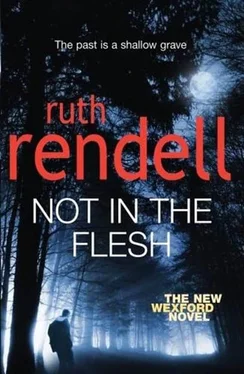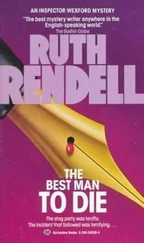“I'm not sure yet,” he said, not entirely truthfully. “Is this your street or is it the next one?”
“This one.”
She got out of the car and ran up the stairs to the front door. Just as Donaldson pulled away, Wexford looked at the front window and saw her head and Bal's silhouetted behind the thin curtains. He rested his head back against the cushion and thought about the two women who called themselves wives-in-law. They had invited him to Athelstan House, he hadn't made the appointment himself. Why had they? There had been nothing they wanted to tell him he hadn't heard before and nothing they wanted him to tell them. He remembered the tray with the biscuits on it and the open jar of lemon curd and an unpleasant thought came to him. Would that wasp which had feasted on it have died if Maeve hadn't first crushed the life out of it? Was that why she had been so quick to seize upon it, even risking a sting?
Bizarre as it seemed as midmorning refreshments, that lemon curd had been intended for him. Was it too far-fetched to think of poison? Of course it was. He must be overtired. Wearily now, he found himself fingering the ring in his pocket. It might have been one of those talismans that abound in fantasy literature, a magic ring that would make him invisible or give him his heart's desire. Perhaps he should make a wish.
“Keep Shamis Imran safe from harm,” he said under his breath, and added, “What a fool I am.”
Something dull and subdued about Matea made him ask. Very young people have a glow about them that starts to fade in the mid-twenties. Jane Austen called it “bloom.” In Matea's case, the bloom had clouded, dulling her eyes and turning her hair lifeless and lank. Though she was as polite as ever, there was a lassitude about the way she served them.
“How are you, Matea? Are you all right?”
The tone in which she said “Fine” would have been funny if it hadn't sounded like misery. She came back with their naan and a jug of water in which she had forgotten to put any ice.
“I wonder what's going on in that family,” Wexford said. “Akande's alerted the Social Services, but there doesn't seem much to be done. According to Mrs. Dirir, Shamis was running around as normal the day after they got back. She couldn't be doing that if she'd just undergone mutilation.”
Burden made a face. “It's nasty, isn't it? It makes you wonder how feminists-all women in fact-can concentrate on any other aspect of persecution of women while female genital mutilation flourishes. Why isn't half the human race up in arms?”
“Is this my old friend Mike Burden talking?”
Burden didn't change color. Blushing was a reaction he had left in the past. “Well, those are Jenny's ideas. I can't say I don't agree, though.”
Matea brought their chicken tikka and Wexford poured them glasses of water. He said nothing about the lack of ice. “I'm going to see Tredown this afternoon.”
“Is that purely sick visiting or because you want a talk?”
“I hope he'll want to talk to me.”
“What, a deathbed confession?”
“It could be,” said Wexford. “Last time I saw him I had a feeling he might say a lot if he could be apart from those two women. Realistically, though, I think only he can tell me how he found Hexham to do his research for him. Was it through some sort of advertisement or by word of mouth? How many times had Hexham been to Athelstan House and how and where did he go when he left on that particular day? In a taxi to Kingsmarkham station? On foot? Surely not. It was pouring with rain. Or did he never leave the place alive? Those are the things I want to know, or rather, the things I'm likely to find out.”
“Do we know how long Tredown has got?”
“You mean till the end? Till death parts him from those two wives of his?”
“I suppose I do, yes.”
“Weeks rather than months, I think. Do you want some halva? Or some yogurt? What I like about this place is that it takes its name literally, it's a passage to India and it picks up national dishes all along the way.”
Afterward he wondered why he had chosen to go in his own car to Pomfret instead of letting Donaldson drive him. It had something to do with the awesome nature of this place, its function as death's waiting room, its humane and tender purpose. Officialdom should not come here and disrupt these last peaceful days where palliative care was all and hope was over.
When he came here before, just to have a look, he had noticed there was nowhere to park cars in the front of the building. He drove in through the gateway, past the pond with the ducks, the hostas and the bulrushes, and followed the paved path that led around the side of the hospice to the back. Here was another arrow pointing to the rather distant car park, an area screened off by trees and shrubs. Five cars were already there and one of them was Maeve Tredown's, the dark red Volvo. He experienced a slight sinking of the heart, a feeling composed of exasperation and a sense of the futility of his coming here at all. He had told her he would be visiting that day. Couldn't she have taken the hint? Or was it rather that she (and possibly Claudia Ricardo, too) had come because he was coming? He could see someone in the car, but it was too far off for him to be sure it was Maeve.
Reflecting on this, he began walking slowly along the drive-way toward an arrow marked “Reception.” When he reached the side of the building and was between its brick wall and a tall chain-link fence, wondering if there was any point in his staying, he heard a car behind him. It was going fast, too fast to negotiate this fairly narrow passage, and he leapt aside. As he did so, turning to face the oncoming vehicle, instead of stopping its driver accelerated. He shouted and threw up his arms, but the car drove straight at him, scooping him up onto its bonnet and swerving to scrape its bodywork along the wall.
It was a bizarre, unreal happening, something he'd seen in films, only heard of in life. He teetered there, sliding, kicking on the slippery surface, trying and failing to get a grip on something, anything. Slithering off, making frenzied sounds, calling for help, he crashed onto the paving stones up against the fence, his right hand out to break his fall. Pain shot up his arm. Afterward he said he knew he was alive because he heard a bone in his wrist crack. The dark red Volvo hesitated only for a moment before charging toward the gateway and out into Pomfret High Street with a roar and a gush of exhaust fumes.
Hannah had slipped the ring on, but it was too big for the third finger of her slender hand, fitting rather more tightly on the middle finger. It seemed an omen. She might wear the diamond Bal had given her for her engagement; no wedding band should ever replace it. If they wanted children she could have them without benefit of matrimony. She was too young to worry about inheritance tax, and the law would be changed by then, anyway. No, she'd never marry, she thought, as Damon came down the police station steps and got into the driving seat.
“She's on a week's holiday and she's staying with her mother,” Hannah said. “Godalming somewhere. Salterton Street. God knows where that is, you'll have to use the satnav.”
Fascinated by modern technology, Damon was delighted to get the chance. The satellite navigation voice, not unlike Hannah's own, directed him the opposite way to where he would have gone if left to himself. He sighed happily. “This woman, isn't there some nutcase boyfriend who's paranoid about her knowing other guys?”
“You're quite safe,” said Hannah, laughing. “It's only one particular guy. She's left him behind in my neck of the woods.”
The little house in a Godalming backstreet was found with ease but no more quickly, Damon insisted, than he could have done on his own. He was mildly disillusioned. Letting them into the house was a very old woman, small, shriveled, stick thin, in a short-sleeved sweater and leggings that would have fitted an undersized twelve-year-old. It was hard to believe she and tall brawny Bridget Cook could be mother and daughter.
Читать дальше











